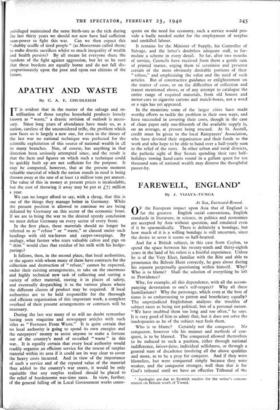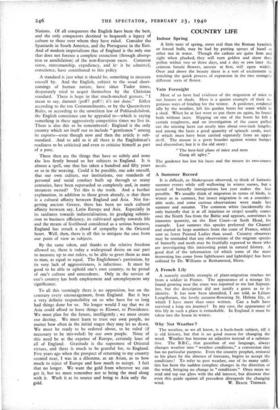FAREWELL, ENGLAND*
By J. VIJAYA-TUNGA
At Sea, Eastward-Bound.
OF the European impact upon Asia that of England is far the greatest. English social conventions, English standards in literature, in science, in politics and economics are accepted by Asia without question, and emulated even if it be spasmodically. There is definitely a bondage, but how much of it is a willing bondage is still uncertain, since the desire to sever it seems so half-hearted.
And for a British subject, in this case from Ceylon, to spend the space between his twenty-ninth and thirty-eighth years in the land of his rulers is a fruitful experience. Unless he is of the Very Elect, familiar with the Ritz and able to pronounce the Belvoir Hunt correctly, he goes about during his sojourn perpetually questioning within himself. Why? Who is to blame? Shall the solution of everything be left to Providence?
Why, for example, all this dependence, with all the accom- panying devastation to one's self-respect? Why all these humiliations? Why the patronage, which even at the best of times is so embarrassing to patron and beneficiary equally? The unprejudiced Englishman analyses the troubles of subject races as being not political, but of a personal nature. " We have snubbed them too long and too often," he says. It is very good of him to admit that, but it does not solve the inadequacies as he of the subject race feels them.
Who is to blame? Certainly not the conqueror. No conqueror, however vile his manner and methods of con- quest, is to be blamed. The conquered allowed themselves to be reduced to such a position, either through national indifference, laisser-faire, individual selfishness, or through a general state of decadence involving all the above qualities and more, as to be a prey for conquest. And if they were blameless, but were conquered simply because they were weaker, and the conqueror stronger, well then that is for God's tribunal until we have an effective Tribunal of the
* Apologies are due to Scottish readers for the writer's concen- tration on Britain south of Tweed.
Nations. Of all conquerors the English have been the best, and the only conquerors destined to bequeath a legacy of culture to those over whom they have ruled. Consider the Spaniards in South America, and the Portuguese in the East. And of modern imperialisms that of England is the only one that does not foresee a complete extinction (through absorp- tion or annihilation) of the non-European races. Common sense, statesmanship, expediency, and let it be admitted, conscience, have contributed to this policy.
A standard is just what it should be, something to measure oneself by. And the English, subject to the usual short- comings of human nature, have since Tudor times, desperately tried to acquit themselves by the Christian standard. There is hope in that much-mocked gesture, " I mean to say, dammit (puff ! puff !) it's not done." Either according to the ten Commandments, or by the Queensberry Rules, or according to the unwritten law of Pukkasahibdom, the English conscience can be appealed to—which is saying something in these aggressively competitive times we live in. There is also this to be remembered: England is the only country which set itself out to include " gentlemen " among its exports—even though now and then the article is sub- standard. And to add to it all there is the Englishman's readiness to be criticised and even to criticise himself as part of a pose.
These then are the things that have so subtly and none "he less firmly bound us her subjects to England. It is almost a spell, one that has taken a hundred and fifty years or so in the weaving. Could it be possible, one asks oneself, that our own culture, our institutions, our standards of personal and social conduct built up through so many centuries, have been superseded so completely and, in many instances ousted? Yet this is the truth. And a further explanation, in addition to those given already, is that there is a cultural affinity between England and Asia. Not for- getting ancient Greece, there has been no such cultural affinity between say, Latin Europe and Asia. Especially in its tardiness towards industrialisation, its grudging submis- sion to business efficiency, its cultivated apathy towards life and the means of livelihood considered as a serious business, England has struck a chord of sympathy in the Oriental heart. Well, then, there is all this to mitigate the case from our point of view as subjects.
By the same token, and thanks to the relative freedom allowed us, there is today a widespread desire on our part to measure up to our rulers, to be able to greet them as man to man, as equal to equal. The Englishman's patriotism, by its very lack of aggressiieness, is infectious. It must be good to be able to uphold one's own country, to be proud of one's culture and antecedents. Only in the service of one's country has both employment and unemployment any significance.
To all this seemingly there is no opposition, but on the contrary every encouragement, from England. But it lays a very definite responsibility on us who have for so long had things done for us. No longer would I say that we in Asia could afford to leave things to Kismet, to Providence. We must plan for the future, intelligently ; we must create our destiny. We must learn to trust our own people, no matter how often in the initial stages they may let us down. We must be ready to be ordered about, to be ruled (if necessary to be mis-ruled) by our own people. None of this need be at the expense of Europe, certainly least of all of England. Gratitude is the supremest of Oriental virtues, and there is much to be grateful for, to England. Five years ago when the prospect of returning to my country seemed near, I was in a dilemma, as an Asian, as to how much to reject of Europe and how much to accept. I feel that no longer. We want the gold from wherever we can get it, but we must remember not to bring the mud along with it. Wash it at its source and bring to Asia only the gold.







































 Previous page
Previous page